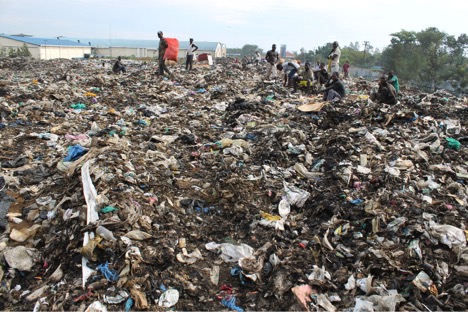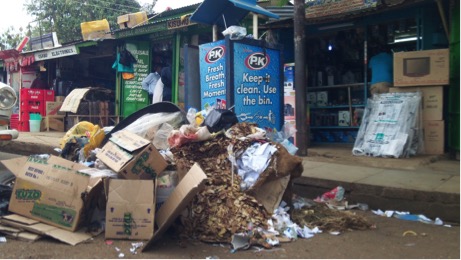WASTE DISPOSAL BIG HEADACHE FOR WESTERN KENYA COUNTIES
Waste disposal remains a challenge to a number of counties in western Kenya despite the introduction of devolved governments. Solid waste management is the responsibility of county governments.
Heaps of garbage is a common sight in many streets and estates in the urban centres as county authorities ponder ways to tackle the menace.
The challenge of waste management has been worsened by the sheer absence of legislation at the county level that govern dumping and how to handle materials that would be recycled.
Siaya, Kisumu, Homa Bay, Migori, Busia and Kericho among many other counties in western Kenyan, currently rely on methods that have yielded dismal results in waste management over time.
The collected waste is ferried to dumpsites in ramshackle trucks that litter the route to an open field where the waste is left to rot.
The uncollected litter ends up clogging drainages, contributing to the perennial flooding during the rainy season. This violates the Constitution of Kenya Cap 69 (1) (g) which calls for the elimination of all aspects that do not guarantee clean environment for citizens.
Kisumu is probably among the few cities in the region with dumpsites in the central business district (CBD), posing a health hazard to residents and inconveniencing business units.
There have been concerns about the dumpsite in the Kisumu’s CBD by the Kenya Airports Authority and Kenya Wildlife Service.
Scarcity of land coupled with conflict of interest over the handling of the waste in Kisumu has hindered efforts to relocate the town’s dumpsite from the CBD.
Leaders and residents have not been able to agree on an alternative site to dump the city’s waste.
Public participation in identifying investors in waste management or looking for alternative dumpsites has been dogged with controversy.
Efforts to raise funds from development partners in France and Germany have been met with resistance including litigation challenging the procedure followed to arrive at entities expected to carry out the task.
“The communities that we have approached to cede, sell or lease land for setting up a recycling plant have since refused to cooperate with us; all that they tell us is that they may not like to see a replication of the dumpsite that we are struggling to relocate from the CBD,” said Kisumu governor Jack Ranguma in an earlier interview.
Mr Ranguma says the lack of land as well as getting sustainable solutions to the menace is frustrating the efforts of the county to relocate the dumpsite.
As the search for land continues, the dumpsite continues to spill over to shopping malls, colleges, hotels, and roads neighbouring the dumpsite affecting business operations in the city.
The most affected is the Kenyatta Stadium that borders the garbage site which has been renovated to host international matches.
A lack of information on safety, usability and business opportunities that come from waste has greatly hindered the relocation of most of the dump sites.
As the debacle continues, residents of Siaya, another major county in western Kenya, are facing a similar crisis.
Siaya governor Cornel Rasanga says acquisition of land for centralised dumping has proven an uphill task.
“We have resorted to the option of buying a site for use. We are only lucky that the amounts of waste generated are still low but all the same, they are of significant quantities requiring prudent management measures before the health hazards become difficult to manage,” Mr Rasanga stated.
In Homa Bay County, the problem spreads beyond solid waste to the difficulties in management of sewerage systems.
The county’s sewerage system is outdated. The towns’ population accounts for 30 per cent of county’s more than 900,000 residents from the 2009 census. This has outdone the capacity of the sewage system in place.
There are fears that some of the sewer overflows are drained into Lake Victoria, the second largest fresh water lake in the world, polluting the water used by locals for domestic use.
Waste management expert advise the county governments to centralise their dumping systems to minimise costs of possible interventions.
“There are cost challenges in transporting waste from the point of generation. It can be costly if the recycling unit is far from the central source,” Mr John Sande, an environment expert in Kisumu said and added that a consolidation of such investment is necessary since it is capital intensive than the already squeezed county devolution budgets can accommodate.
“The key solution to this menace is contracting a private entity with the machinery to sort, recycle and produce by-products from these waste material that have continued to be a problem,” says Mr Sande.
Small community groups that have expressed interest in assisting the counties in managing the crisis as a stop-gap measure have also been beaten to the task.
There is a need for more investment in companies that can reuse the waste since those that churn products from them at the moment run below 30 per cent capacity.



